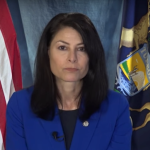By John Clore | Investigative Journalist | 4/2/2025 at 7:11 AM
Michigan Lawmakers Pitch Earmarks Publicly for the First Time — But True Transparency Still Dies in Darkness
LANSING — For the first time, Michigan House lawmakers are publicly disclosing their budget earmark requests under new transparency rules aimed at shedding light on a process long criticized for secrecy and favoritism.
The rules, championed by Republican House Speaker Matt Hall and adopted in a unanimous House vote earlier this year, require lawmakers to disclose earmark proposals by May 1 if they want them considered in the state budget. Hall has pledged to block House votes on any budget bills containing undisclosed earmarks.
So far, only 13 earmarks have been made public—far fewer than the more than 320 earmarks totaling $1.4 billion that passed in 2023, many of them buried in last-minute budget negotiations with little public scrutiny.
The requests range from the expected—road repairs and fire equipment—to the curious, including $425,000 for a private gun club’s indoor range and a vague “simulator” project at Kirtland Community College with no clear purpose listed.
-

DOGE Travel mug with a handle
$25.00 Add to cart -

Unique D.O.G.E. Ceramic Mug – 11oz & 15oz
$7.68 Select options This product has multiple variants. The options may be chosen on the product page
Rep. Reggie Miller (D-Van Buren Township), who submitted three earmark requests, called the new rules “a big step in the right direction” and said taxpayers deserve greater transparency in the budget process. But critics argue that these new rules, while a modest improvement, do little to address the larger transparency crisis in Lansing.
A Missed Opportunity for True Government Transparency
Notably absent from these efforts was support for The Transparency Act, a ballot initiative put forward by the nonpartisan group Michigan Initiatives, which sought to expand Michigan’s Freedom of Information Act (FOIA) to include the executive and legislative branches—currently exempt from FOIA disclosures.
Despite broad public support for government transparency, Michigan lawmakers refused to back the measure. Without legislative or financial support, the initiative ultimately died, marking yet another missed opportunity to bring full accountability to state government.
Michigan remains one of only two states where the governor and legislature are not subject to public information requests.
Transparency for Some, Silence from Others
While the House implemented its own disclosure requirements, the Senate—controlled by Democrats—has made no such changes. Senate Majority Leader Winnie Brinks (D-Grand Rapids) has not indicated whether similar rules will be considered, creating a stark divide in transparency standards between the chambers.
Even Governor Gretchen Whitmer, who has publicly called for more openness in the earmark process, has only proposed that grant information be posted online five days before the budget vote—a far cry from Hall’s timeline of public disclosure months in advance.
Still, critics argue that Hall’s commitment to transparency is selective at best. While he has taken credit for increased budget disclosure, Hall has refused to take up the Senate’s bipartisan public records disclosure plan, which would bring both branches of government under FOIA.
And in a move drawing further scrutiny, Speaker Matt Hall was among several lawmakers who received campaign contributions from Pfizer in 2024, raising questions about pharmaceutical influence as Lansing debates public health policies and state spending priorities.
Earmarks, Scandals, and Political Patronage
Earmarks have long been criticized as a vehicle for political favoritism. A 2023 $25 million grant went to a nonprofit founded by a former aide to House Speaker Jason Wentworth—now under investigation. In another case, a Macomb County developer awarded a $5 million earmark for a motel renovation funneled hundreds of thousands of dollars in donations to lawmakers.
This history of backroom deals and political patronage is precisely why watchdogs and transparency advocates have called for broader reforms.
Adding to public concern, an investigative report titled “The Money Trail Behind Tesla Dealership Vandalism and Guess Who’s Funding the Protesters?” has traced financial links between taxpayer-backed nonprofits and politically motivated protest movements. The findings highlight the need for not just budget transparency, but comprehensive disclosure of nonprofit spending and influence within state politics.
The Bigger Picture
Though the new House rules may create a veneer of openness, critics say they do little to address the deeper issues at play—namely the continued shielding of lawmakers and the executive branch from the kind of scrutiny ordinary citizens and local governments face under FOIA.
Until Michigan lawmakers commit to full transparency—not just within the confines of budget earmarks but across the entire apparatus of government—voters will continue to be kept in the dark about how their money is spent and who’s pulling the strings.
Featured Articles
DOGE on Michigan Wasteful Spending: LGBTQ, DEI, and Transgender Study Funds Could Fix the Roads Instead!
by: John Clore | 3/20/2025 at 9:11 AM LANSING, MI – After writing Shocking Waste: Federal Audit Uncovers Billions Wasted on Foreign Social Programs And seeing countless people on social media say, “We need DOGE in Michigan,” I decided to DOGE Michigan’s wasteful spending—here’s what I uncovered. Michigan’s state government
Sponsor
Investigative Reports
The Quiet Collapse: Why Humanity May Stop Having Children by 2075
Engineered Extinction? The Global Push to End Reproduction Through Culture, Chemicals, and Control Over the past several decades, the world has witnessed a troubling trend—a steady and accelerating decline in childbirth rates. While many governments and media outlets frame this as a byproduct of modernity or personal choice, the reality


















